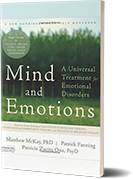
Why emotion regulation skills training?
Who doesn’t struggle regulating their responses to emotions? Let’s face it, all of us we’re constantly choosing how to respond to those emotions that show up in our internal world, up and down, left and right, and sometimes more than others.
Our emotion regulation training curriculum includes 10 specific sessions that are skill based and will teach you to develop effective behavioral responses in your day-to-day living instead of getting trapped in the emotional rollercoaster that shows up your way at times.
what would you learn…
When thinkiing about emotion regulation problems there are core skills for you to learn to deal effectively with two things: (1) your private experiences such as your thoughts, emotions, and sensations and (2) external situations that come your way because people do or say things that are upsetting to you.| WEEK 1 | Psychoeducation about emotions and the cost of avoidance:
Participants will discuss how emotions work and their purpose in our lives; skills to observe their emotions, identify the four components of an emotional response, and the costs of avoidance will be presented to clients.
| WEEK 2 | Values in action
Participants will learn to identify their key values in different areas of their life.
| WEEK 3 | Mindfulness and emotion awareness
Participants will learn what is mindfulness and skills to focus on the present instead of focusing on the future or past
| WEEK 4 | Defusion
Participants will learn to notice their negative thoughts and skills to detach from them so they will be less likely to intensify painful emotions.
| WEEK 5 | Cognitive Flexibility Training
Participants will learn how to broaden their pattern of thinking through observing, describing and responding differently to five problematic thinking patterns.
| WEEK 6 | Self-Soothing
Participants will discuss relaxing and pleasurable activities and how to incorporate them in their everyday life to reduce stress and to increase quality of life.
| WEEK 7 | Doing the opposite
Participants will learn alternative behavioral response to their painful emotions as an effective skill to regulate their emotions and to have more quality of life.
| WEEK 8 | Interpersonal Effectiveness
Participants will learn skills to develop assertive communication and deal with interpersonal conflict.
| WEEK 9 | Imagery-based exposure
Participants will learn skills to observe, label and experience their painful emotions without getting hooked on them.
| WEEK 10| Interoceptive exposure and situational exposure
Participants will learn how to face triggering situations and bodily sensations as a skill to move forward in their life.

Recommended reading:
Mind and emotions: a universal protocol for emotional disorders (2015).
A self-help merit from the Association of Cognitive Behavioral Therapy (ABCT).
Get your survival guide for dealing with emotion regulation challenges right now!
